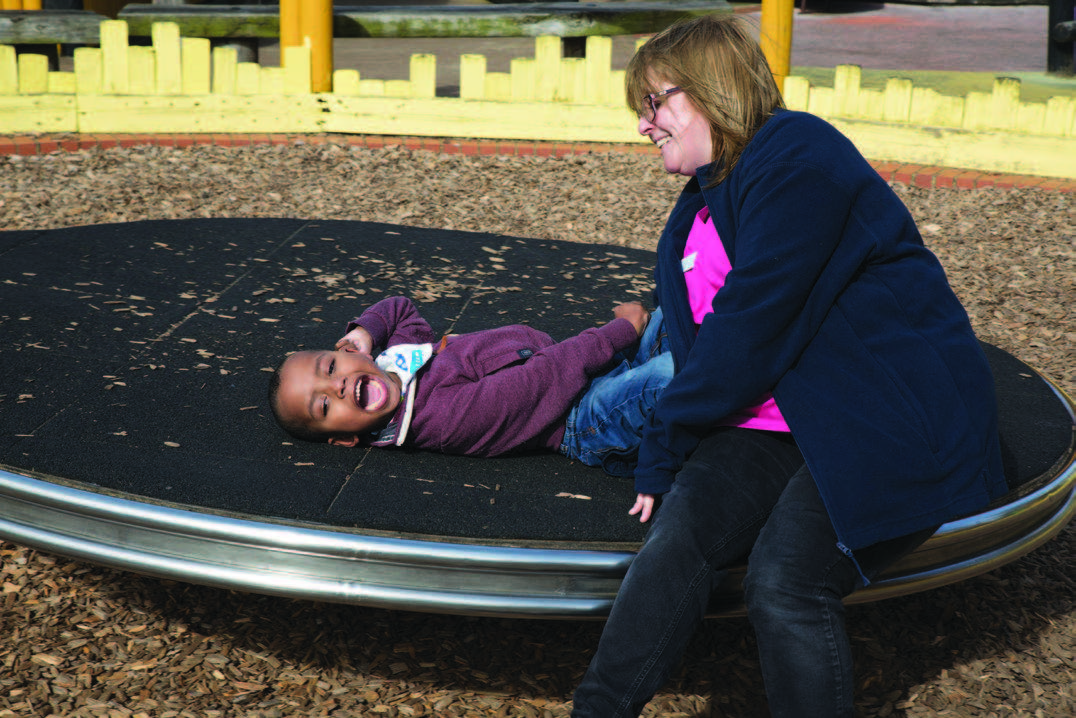
Most readers will be aware of the excellent Chestnut Tree House children’s hospice, based in Arundel. But not everyone is aware that the hospice is only one aspect of the services offered by the charity. The charity also offers vital support services in the community, helping to look after children with progressive life-shortening conditions who are living at home.
Ian Trevett met Susan Freeman, Community Care Support Worker and Activities Coordinator for East Sussex, to find out more about the charity’s outreach in East Sussex.
“A lot of the care we offer day-to-day is respite, giving parents and carers a break,” says Susan. “All families are offered a package of respite care in-house over in Arundel along with a visit from the Community Team each month. Because East Sussex is so far from the house families can find it hard to travel there so the support of the Community Team is invaluable to families here.
Due to the complex nature of the health issues facing the children, there is no set formula to how a respite visit works.
“Some people like you to stay in the house and they like to stay with you, so you’re just there at the family’s home offering support. Others like you to take the child out as soon as you get there and not bring them back until the last minute. We might take them to the cinema, get something to eat or visit a farm. We might take them out to Knockhatch as they support us as a charity partner and they let the children in for free.”
Clearly, it is not quite as straightforward as offering a child-minding service. “We look after their health needs while we’re out and keep an eye on them. They will have a comprehensive care plan that we strictly follow.
“A lot of our children don’t eat orally so there are only a few that you can take out to eat out. We have an issue with where to change the children. Some of the kids are big and we can’t lift them, so if they need changing we need hoists and changing tables and there aren’t many around. There’s one in Eastbourne town centre, one on the seafront in Hastings, one on the seafront in Brighton, but few others. Knockhatch are building a special ‘Changing Places’ changing facility which is amazing because there are not many places that do this.”
If anything, Susan understates the difficulty of offering the children a few hours enjoyment and the parents some well-deserved rest. For instance a child might be on oxygen and they might be fed through a tube. It is quite an undertaking to transport a child to and from a car. You’ve got to make sure there’s somewhere to change them or change one of their tubes.
It is a huge, huge undertaking, and also a massive learning curve for Susan, who previously worked as a nanny. “The biggest challenge has been the competency,” she says. “You have to be child specific competent so you can take the kids on your own. When you are out, you don’t have the back-up you would get at the hospice. So you need to be prepared for the individual child’s needs.”
The role of care support worker also includes looking out for the family. “We might do an evening babysit so parents and carers can go out for dinner. It varies from one family to the next and what they do with their time. Some use it to tidy and clean up and others just use it to put their feet up or go to bed. It just gives them that much-needed time. On top of that, we’re contacting doctors, hospitals and just helping them out with necessary tasks they have to face.”
It isn’t always easy for parents to properly relax and part of the care worker’s skill set is to gain the confidence of a parent, as Susan explains: “They’re obviously very nervous about handing their children over, so it takes a long time for them to build up the confidence that you know what you’re doing. They might stay in the house but not completely with you and then eventually hopefully they will feel able to relax. Many of our families are so used to being the sole carer. They’re the only ones who know their children. Even the doctors don’t know their children and their needs. To then have somebody come and say “Oh, I’ll just take over” is just very difficult.”
Susan and her co-workers do an admirable job in assisting the families who have been through so much, and sadly part of job means dealing with the emotions when a child passes away. As professional as the workers are, they are only human and an emotional attachment is hard to avoid. The charity offers a great support and counselling network for the families and the staff as well.
The other aspect of Susan’s role is organising activities for the children and their families, and the charity gets great support from local companies in supporting these events. The Hydro Hotel provides complimentary rooms for some of the events which have been used to host a grandparents’ afternoon tea and a summer party.
Sussex Police ran a family fun day for the under-12s and also put on a drone flying event.
There is a monthly under-5s group called Saplings and a youth group which is every other month for the over-12s.
“It is important to remember the brothers and sisters,’ says Susan. “We run a club called Siblings, which is every school holiday and a couple in the summer holidays, an event for siblings of the children we care for. It is good for them to see others in the same situation and we always have therapists on hand ready if someone did start opening up. The siblings also have complex needs.
“They miss out on things like days out because it’s not always practical to take their sibling along to days out. Over the summer we took them to Blackberry Farm and Sussex Police arranged a fun day at St. Bede’s School, plus we had a trip on the Bluebell Railway.
Meeting Susan was inspirational, and it is hard to properly describe the difference Susan and her colleagues make to the quality of life for the children and their families. Please support Chestnut Tree House and get involved, so they can continue this vital work.






